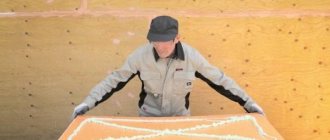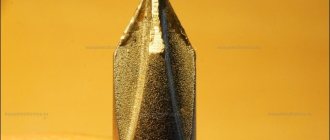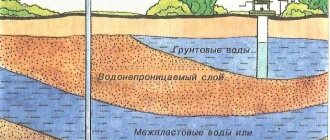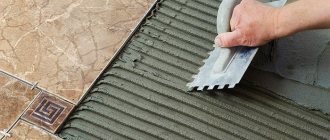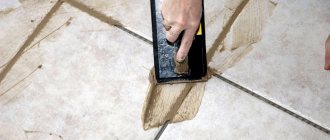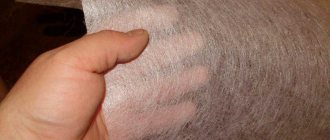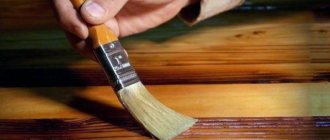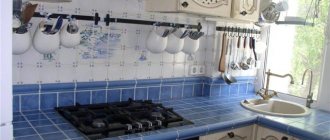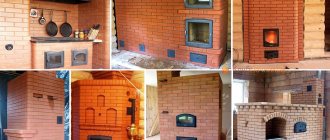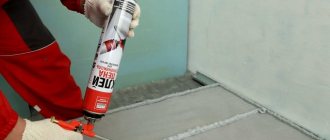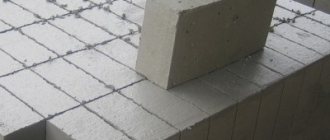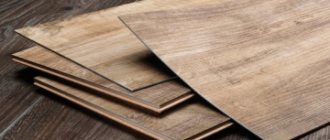Porcelain stoneware has some qualities that do not allow the use of any tile adhesive for it. To answer the question of which adhesive is best for porcelain tiles, it is worth considering the size of the tiles and the operating conditions of the coating. Porcelain stoneware is a universal finishing material with excellent aesthetic and performance properties, which allows it to be installed in almost any conditions, indoors and outdoors (here is an article about adhesive for outdoor use).
But in order for the tile to meet the requirements for reliability and durability, it must be glued strictly according to technology using a suitable adhesive mixture.
What should be the glue for porcelain tiles?
Modern manufacturers usually offer a dry adhesive mixture that is cement-based. The composition also includes synthetic resin, plasticizer and special polymers; they give the material the necessary plasticity, increased adhesive properties and mechanical strength.
Regular tile adhesive is not suitable for porcelain tiles.
Dry mixtures are diluted with water, strictly observing the specified proportion, and stirred with a mixer. Also in the product line you can find ready-made paste adhesives. They come in buckets and are ready for use immediately after opening the lid. Such mixtures are made on a polyurethane or epoxy base.
They have better quality characteristics and higher cost. Such compositions are used only if it is impossible to select a dry cement-based adhesive that meets all the requirements.
All requirements for adhesive mixtures arise from the quality characteristics of the porcelain tiles themselves. The adhesive mixture must have:
- High adhesion rate;
- Elasticity;
- Holding capacity that corresponds to the size of the tile;
- Frost resistance (if we are talking about outdoor work).
Mixing the composition
It is worth dwelling on each of these points in more detail.
Varieties of compositions according to various characteristics
Among the first criteria for choosing the best adhesive for porcelain tiles, the applicability of the composition for interior or exterior work stands out. The former have relatively fewer requirements, but environmental friendliness is important. With the help of the latter, it is often possible to perform facing work at temperatures below +5 degrees Celsius due to their inherent frost resistance. Let's look at other criteria below.
By composition
The greatest demand is for mixtures based on white or gray Portland cement. It also contains fine sand and modifying additives. The content of the latter does not exceed 5% of the total volume.
The table provides a brief description of the effect of common additives on adhesive.
| Additive type | Functional load |
| Methylcellulose ether | Promotes moisture retention, which affects the rate of hardening of the adhesive mass. |
| Starch ester | Affects the deformation index of the material. |
| Polymers and resins | Helps improve adhesion, increase ductility, and reduce the likelihood of cracks. |
| Synthetic and vegetable fibers | They prevent the tiles from slipping during installation and have a positive effect on the strength of the adhesive after it dries. |
See also: Catalog of companies that specialize in finishing materials and related work
If the working base is not a cement screed, but plywood, plastic, chipboard, metal, plasterboard or wood, then the best solution would be to choose a dispersion composition. It has high adhesive properties. It is also worth noting that this glue has the lowest consumption compared to its analogues.
Less commonly, epoxy compounds are used for the installation of porcelain tile cladding. However, such tile adhesives are excellent for working with large-format porcelain tiles and heavy tiles. There is also strong resistance to moisture both indoors and outside the building. In combination with the glue, a catalyst is used, which has a positive effect on the strength properties of the dry residue. It is important to note that excess solution from the front surface of the coating must be removed before it hardens. Then it will be difficult to do this without damaging the finish.
An example of epoxy adhesive for any type of tile Source dd-stroi.ru
Today, a group of adhesive materials called liquid nails is in increasing demand in the construction market. In the case of porcelain stoneware, some of them are acceptable for use if it is mosaic finishing or repairing a small area. Samples with polymer components and synthetic rubber have the necessary qualities. There is a high probability of release of toxic substances in addition to an unpleasant odor. Water-based compounds are safer, but they cannot be used for cladding wet rooms.
By functionality
This criterion refers to the behavior of the adhesive, which is influenced by any modifying additives. That is, specific problems can be solved using certain adhesive compositions. In particular:
- Alignment . Here only minor localized deviations of the plane from a given level and small depressions are considered. The fluid solution can be used either to eliminate defects at the base preparation stage, or during facing work. The scope of application extends to internal floors and walls, facades, loggias and the basement of the building.
Leveling compound for laying porcelain tiles Source sdvor.com
- Laying dimensional tiles . Unlike leveling compounds, thick-layer ones can be applied over the entire working area with an increased thickness of over 10 mm. This is relevant if glue is needed for tiling with large-format tiles.
- Strengthening the base for tiles . For this, a reinforced type of glue is used. The material can withstand significant loads and is also characterized by increased adhesive ability (including to metal). The composition usually contains polyurethane or epoxy resin.
Quick-hardening and elastic options deserve special attention. The former, unlike their analogues, begin to harden not after a day, but after about 3 hours. That is, the coating is ready for use almost immediately. But it is worth paying attention that the working time of the solution is limited to only 30 minutes. The compositions exhibit excellent adhesion to most substrates, resistance to moisture and temperature changes.
Elastic and highly elastic adhesives are used, as a rule, for lining heated bases and swimming pools, respectively. They have excellent contact with drywall, plywood and any type of wood. They are also characterized by resistance to water.
An example of a superelastic mixture Source goodceramic.ru
Adhesion
Adhesion of materials, or in other words, the adhesion strength of surfaces, is one of the key points when choosing adhesive compositions. Porcelain stoneware has almost zero water absorption, which is due to the low porosity and high density of the material.
The adhesion of such a surface to ordinary glue will be very weak; it cannot absorb the glue, as happens when gluing ordinary ceramic tiles. That is why the selected mixture must have increased adhesive abilities - high adhesion, which can provide the necessary quality of adhesion of materials.
Required glue consistency
The minimum adhesion of the adhesive mixture for porcelain tiles up to 40×40 cm in size is 0.5 MPa, and for large tiles – from 1.2 MPa.
How to prepare the surface
Porcelain tile adhesive should be applied to a dry, hard, clean surface. It is necessary to remove traces of oils, soot, and small foreign particles.
If the base is glossy, then it must be sanded until matte. Surfaces with low moisture resistance must be thoroughly cleaned and washed.
To remove visible irregularities on the surface, you can use a grout or primer.
Advice! It is not recommended to level the base with glue. For these purposes, specialized compounds are used.
Elasticity
This indicator is especially important when the tiles are laid on a complex non-absorbent surface, this could be a layer of waterproofing, old tile trim or a painted wall, as well as in conditions of temperature shock, when they are laid on porcelain tiles on a heated floor system, in a steam room or outdoors.
Applying glue
Here it is recommended to use highly elastic adhesive compositions, they are also called deformable. If the adhesive is made according to the European standard, this property is marked S1 or S2. If porcelain tiles are laid on a stable mineral base under normal conditions, then there is no point in buying highly elastic mixtures.
Important! When buying adhesive for porcelain tiles, you should also pay attention to the expiration date. For dry mixtures, it can reach 24 months from the date of manufacture, and for pasty mixtures, as a rule, from 6 to 12 months.
Instead of an epilogue
A review of the market for the materials in question has established that it is, for the most part, dominated by brands from a foreign manufacturer, or products manufactured in the Russian Federation under a foreign license. The Russian manufacturer is poorly represented, but its products are the most adequate in terms of price-quality ratio. Professionals recommend purchasing adhesives only from trusted online stores, or better yet, from retail chains, in order to be able to quickly contact the seller if any complaints arise regarding the quality of the product.
Frost resistance of glue
It only matters when laying porcelain stoneware outdoors or in unheated rooms. The parameter is indicated on the packaging with the Latin letter F and a number that indicates how many freezing and thawing cycles this brand of glue will withstand. As a rule, these are numbers from 15 to 100. For cladding external surfaces, it is better to use glue that will withstand at least 50 cycles.
Advice! Two-component adhesives based on epoxy or polyurethane are more resistant to temperature changes and high humidity.
Video description
In this video, the master shares his experience in laying inexpensive porcelain floor tiles on top of a heated base in the kitchen:
Universal
This is a separate group of adhesives that is used for facing work with both tiles or artificial stone, and porcelain stoneware. More often it also means the possibility of laying tiles inside and outside the building. But such a composition is unacceptable for large-format workpieces (from 300*300 mm) and for operation under conditions of sharp fluctuations in temperature, humidity and significant mechanical load. Direct contact with water should also be avoided.
Viability of solution
This term refers to the time during which the glue retains its adhesive properties after stirring. The viability indicators of the solution are selected depending on the temperature and humidity conditions at the time of laying the material.
It is advisable to lay porcelain tiles at air temperatures above 5 degrees
- If porcelain tiles are laid at low temperatures (less than 14°C), the adhesive must be quick-setting;
- If the tiles are laid in the warm season or in a well-heated room, the mixture should dry a little longer so that the master has time to lay and level the tiles.
Advice! When choosing glue, it is important to take into account that the drying time of the composition and the adjustment time differ significantly. For example, if the pot life of the solution is about four hours, then the time for adjusting the tiles is usually 15-20 minutes.
Litokol Litoplus K55
Volume : 25 kg.
Price : 787 rub.
Renovating an apartment is always a big expense; you want everything to be done efficiently. But sometimes you can save money, because today is the time when you can read reviews from customers who managed to buy a cheap but high-quality product. Litokol Litoplus K55 is a good and relatively inexpensive (compared to others) glue.
We can roughly highlight its main advantages:
- white consistency;
- freezes well;
- holds perfectly;
- has no smell.
Litokol Litoplus K55 glue is a real find for those who decide to start a renovation! It does not emit the unpleasant odor characteristic of many adhesives, and it is quickly washed off the tools. The glue hardens quickly and well - do you really need anything else from the glue?
Classification according to the European standard: what does C1 and C2 mean?
Domestic requirements for the production of adhesive mixtures today are minimal. In many ways, they do not differ from GOST standards, which were developed for cement-sand mixtures with the simplest additives. Considering this fact, when choosing adhesive mixtures for porcelain tiles, it is better to focus on manufacturers with products that meet the European standard EN 12004
- The C1 (“basic class”) marking indicates that after cyclic freezing and thawing, the adhesive adhesion will be 0.5 MPa. The exposed layer of glue retains its properties for no more than 20 minutes.
- The C2 marking means that the mixture is approximately twice as good as the “base class” in all respects. It makes sense to use such adhesive mixtures for external cladding or on the floor in high-traffic areas.
Use a special spatula to apply glue
- The T marking indicates that the adhesive mixture, depending on the force of impact, can change the density. Simply put, if the master presses the tile harder against the adhesive layer, it will sink a little into it, but when the force disappears, the mixture will become thicker and “grab the tile” almost instantly. This allows you to minimize the sliding of the material on vertical surfaces. The maximum permissible slipping of 150×200 mm format tiles glued to a mixture marked T cannot exceed 0.5 mm.
Terms of use
The glue can be sold in packages of different sizes and packaging. But you need to prepare the substance per 1 m². In this case, it is not recommended to follow the manufacturer’s instructions; it is better to gradually mix the solution, the consistency of which resembles thick sour cream.
It will be convenient for the master to use a construction mixer for high-quality mixing.
After this, the glue must sit for 20 minutes to gain the necessary strength and ductility. Even a beginner can cope with the procedure of mixing the adhesive mixture. Therefore, you can save a lot and not purchase ready-to-use one-component adhesive.
Adhesive for porcelain tiles: types and rules of use (2 videos)
Types of adhesive for porcelain tiles (42 photos)
Adhesive for porcelain tiles on heated floors
Porcelain stoneware has good thermal conductivity and retains heat for a long time; this material is ideal for laying on a heated floor system, but in this case additional requirements are placed on the glue.
Laying porcelain tiles on a heated floor
The mixture should have enhanced adhesive properties and high elasticity, which will help eliminate the stress caused by sudden temperature changes. There should be a note on the packaging stating that the adhesive can be used in combination with this heating system.
Important! You can turn on the heated floor system only after the glue has completely dried.
Mapei Keraflex Maxi
Volume : 25 kg.
Price : 1,461 rub.
Mapei Keraflex Maxi adhesive is used for laying ceramic and natural stone tiles. There are quite a few options for using glue: it can be used to treat floors, cement screeds, gypsum bases, walls, etc. If you need a good repair adhesive, you can count on Mapei Keraflex Maxi .
The adhesive has impressive characteristics, which makes it stand out on the market of construction materials: it has excellent adhesion, good resistance to alkalis and solvents. Buyers give this glue 5 stars out of 5 - feel free to buy it for work!
Adhesive for porcelain tiles: photo
Weber Easy Fix
Volume : 25 kg.
Price : 275 rub.
If you are looking for high-quality and reliable glue when thinking about repairs, then you have found it! Weber Easy Fix shows excellent adhesion and ductility. Reliably adheres tiles and is suitable for small format porcelain tiles.
If there is a need to glue large-format tiles, then to enhance the effect and reliability, it is necessary to coat the wall and the back side of the tile with glue. This glue also has disadvantages - it is not suitable for heated floors. The glue mixes well, and all the lumps dissolve in the process.
Consumption of the finished mixture
The consumption of the adhesive will be determined by the method of its application to the surface.
On average, consumption ranges from 1 to 1.9 kg/m². If you apply glue with a spatula, then the consumption will be significant; if it is a comb, it will be significantly reduced.
Important! Consumption is also determined by the dimensions of the porcelain stoneware slabs. The larger the material, the thicker the adhesive layer should be. Therefore, for slabs of size 10*10 and 20*20, the consumption will be 3.8 kg/m², and for material 40*40 it is 2 times more, that is, 7.6 kg/m².
Manufacturers rating
When choosing an adhesive for porcelain tiles, you need to take into account not only all the listed criteria and features of both the materials themselves and environmental conditions, but also the ratings of popular manufacturers.
The brands and brands existing in modern markets are popular for a reason. This is due to various reasons: a wide range, the ability to satisfy any requirements and wishes of customers, reliability, good fixation, long service life and much more.
The list of leaders in the rating included such brands as:
- Knauf.
- Ceresite.
- Bergauf.
- Unis.
- Litoflex.
- Mapei.
- Axton.
- Found.
- Volma-ceramic.
Popular brands
Mixtures from the following branded manufacturers are considered to be of good quality:
- Weber Vetonit Stone Fix. Suitable for interior work, covering areas on terraces, loggias, balconies. Can serve as the basis for creating a heated floor.
2. Hercules GM 55. Allows you to work with large and heavy porcelain stoneware slabs and any surfaces, it is universal with a reinforced composition.
3. Keratex. Sold in dry form, the mixture is waterproof, has a cement-sand base with chemical additives in its composition.
4. Perfecta allows you to work with slabs of both small sizes and large formats; it is a reinforced substance. You can attach trim to it on a vertical and horizontal plane.
Also among the popular brands in demand are Volna-Keramik, Yunis granite, Yunis 2000, Bergauf keramik, Ceresit SM-11, Litoflex K80, Knauf FLIESEN, Osnovit Mastplix T-12.
Unis Plus
Volume : 25 kg.
Price : 391 rub.
Absolutely universal glue Unis Plus will cope with most tasks. Some people have been using it for several years and are happy with everything. The composition of the glue is quite simple; it contains Portland cement, modifying additives and mineral filler.
Unis Plus is suitable for use on any substrate, even plaster. Suitable for exterior and interior use. Moreover, in places with high traffic and constant precipitation (snow, rain) it performs excellently. Masters consider this glue to be the best, should we believe them?
